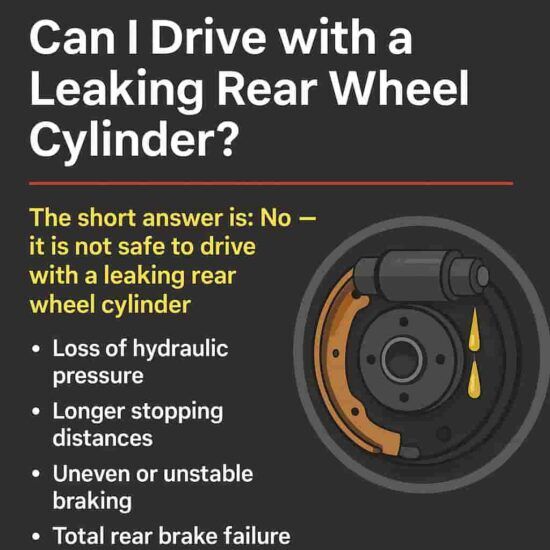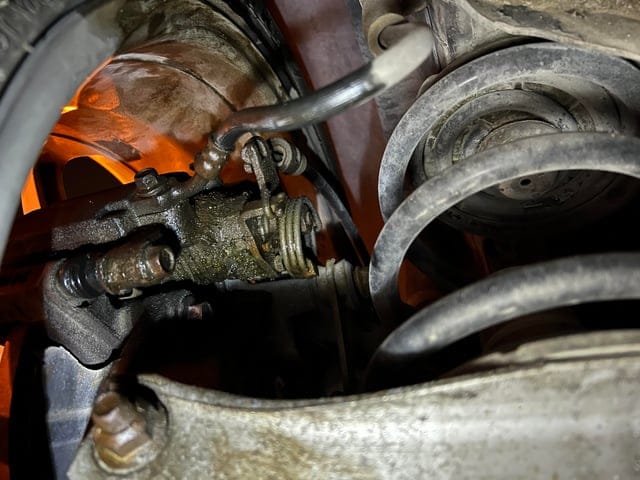Have you ever noticed a strange puddle under your car and wondered if it’s just water or something more serious? If that fluid is brake fluid, your safety could be at risk every time you hit the road.
Driving with leaking brake fluid isn’t just a minor issue—it can directly affect how well your brakes work, putting you and others in danger. Before you take another drive, it’s crucial to understand what leaking brake fluid means for your car and what steps you need to take.
Keep reading to find out why ignoring this problem could have serious consequences and how to protect yourself behind the wheel.
Brake Fluid Role
Brake fluid plays a vital role in a car’s braking system. It transfers force from the brake pedal to the brake parts. This force makes the vehicle slow down or stop safely. Without proper brake fluid, braking becomes weak or may fail.
How Brake Fluid Works
Brake fluid is a special liquid that does not compress. When you press the brake pedal, it pushes the fluid through brake lines. This pressure moves the brake pads against the wheels. The friction between pads and wheels stops the car. Brake fluid must stay clean and full for brakes to work well.
Types Of Brake Fluids
There are different types of brake fluids. The most common are DOT 3, DOT 4, and DOT 5.1. These are glycol-based and mix with water over time. DOT 5 is silicone-based and does not mix with water. Each type has different boiling points and uses. Using the right brake fluid keeps the system safe and effective.

Credit: www.reddit.com
Causes Of Brake Fluid Leaks
Brake fluid leaks are a serious issue for any vehicle. They reduce the braking power, making driving unsafe. Understanding what causes these leaks helps prevent accidents. Brake fluid is vital because it transfers force to the brakes. Any leak means less fluid and weaker brakes.
Leaks happen for several reasons. Parts wear out or get damaged. Sometimes, poor maintenance leads to leaks. Knowing common leak sources and signs helps spot problems early. Acting fast can save lives and money.
Common Leak Sources
Brake fluid leaks often start at worn seals. These seals are in the master cylinder and calipers. Old or cracked seals let fluid escape. Brake lines can also leak. Rust or damage causes cracks in these lines. The wheel cylinders and brake hoses are other common places. Loose fittings or broken parts also cause leaks. Dirt and debris can damage brake parts and cause leaks.
Signs Of A Leak
Spotting a brake fluid leak early is important. Look for wet spots under the car near wheels or the engine. The brake pedal may feel soft or sink to the floor. Warning lights on the dashboard can alert you. A burning smell or reduced brake performance also signals leaks. If you notice any of these signs, check the brake system immediately.
Risks Of Driving With Leaks
Driving a car with leaking brake fluid is dangerous. The brake system depends on this fluid to work well. A leak lowers the amount of fluid, making brakes less effective. This problem can grow quickly and cause serious trouble on the road.
Brake Performance Issues
Brake fluid leaks reduce the pressure in brake lines. This causes the brakes to feel soft or spongy. The car may take longer to stop or not stop fully. This can lead to accidents, especially in emergencies. The brake pedal might sink to the floor, signaling a big problem.
Safety Hazards
Leaking brake fluid is a serious safety risk. It can cause the brake system to fail completely. Losing brakes at high speeds is life-threatening. Also, brake fluid is flammable and can damage other car parts. This increases the chance of fire or costly repairs. Ignoring leaks puts the driver, passengers, and others at great risk.

Credit: coventrymotorsny.com
Immediate Actions To Take
Discovering a brake fluid leak requires quick and careful action. The brake system relies on this fluid to work properly. Without enough fluid, brakes may fail, leading to serious danger. Knowing what to do immediately can keep you safe and protect your car from damage. Focus on two key steps: checking fluid levels and deciding when to stop driving.
Checking Fluid Levels
First, open the car hood and find the brake fluid reservoir. It usually sits near the back of the engine bay. Look at the fluid level against the marked lines on the reservoir. If the fluid is below the minimum mark, it means there is a leak. Do not add fluid without fixing the leak first. Adding fluid only hides the problem temporarily and can be risky.
When To Stop Driving
Driving with low brake fluid is unsafe. If the brake pedal feels soft or sinks to the floor, stop driving immediately. These signs show your brakes may fail soon. Find a safe place to pull over and turn off the engine. Call for roadside assistance or a tow service. Do not try to drive to a repair shop on your own. Safety must come first.
Repair And Maintenance
Repair and maintenance play a key role in keeping your car safe and reliable. A leaking brake fluid issue should get immediate attention. Ignoring it can lead to brake failure. Proper care ensures your brakes work well and protect you on the road.
Professional Inspection
A professional mechanic checks the brake system thoroughly. They find the exact source of the leak. They test the brake fluid level and pressure. This inspection helps prevent future problems. Trust experts to give your car a full safety check.
Fixing Leaks
Fixing brake fluid leaks requires skill and the right tools. Mechanics replace damaged brake lines or seals. They also refill the brake fluid to the correct level. A quality repair restores brake performance. It stops the leak from causing accidents or damage.
Preventive Tips
Regular brake checks help catch leaks early. Look for wet spots under your car. Check the brake fluid level often. Avoid hard braking and rough driving. Keep your brake system clean and dry. These steps extend the life of your brakes and keep you safe.
Long-term Impact
Leaking brake fluid can cause serious problems over time. The long-term impact affects both your car’s safety and your wallet. Understanding these effects helps you make smart decisions about repairs.
Effects On Brake System
Brake fluid is essential for your brakes to work properly. A leak lowers the fluid level, making the brakes weak. This can cause longer stopping distances or even brake failure. Over time, the leaking fluid may damage brake parts. Corrosion and rust can form inside the brake lines and cylinders. This damage leads to costly repairs and unsafe driving conditions.
Cost Implications
Ignoring brake fluid leaks can lead to expensive fixes. Small leaks may only need a fluid top-up and seal repair. Large leaks often require replacing brake lines or the master cylinder. Repair costs rise if the problem worsens. Also, driving with weak brakes risks accidents that cause even higher expenses. Fixing leaks early saves money and keeps you safe on the road.

Credit: www.cnbrakecylinder.com
Frequently Asked Questions
What Happens If Brake Fluid Is Leaking?
Leaking brake fluid reduces hydraulic pressure in the brake system. This causes weak or unresponsive brakes, increasing accident risk. Immediate repair is essential for safe driving and to prevent brake failure or damage to brake components.
Can I Drive With Low Brake Fluid?
Driving with low brake fluid is unsafe. It can cause brake failure or reduced braking power. You should check and top up the fluid immediately and have the leak repaired before driving further.
How To Identify A Brake Fluid Leak?
Look for wet spots or stains near wheels or under the car. A burning smell or soft brake pedal also indicates leaks. Regular brake system checks help spot leaks early and avoid accidents.
What Causes Brake Fluid Leaks?
Common causes include worn brake lines, damaged seals, or corroded components. Accidents or poor maintenance can also cause leaks. Timely inspection and repair prevent brake system failure and ensure vehicle safety.
Conclusion
Driving with leaking brake fluid is very risky. Brake fluid keeps your brakes working well. A leak can cause brakes to fail suddenly. Always check brake fluid levels often. Fix any leaks immediately for safety. Don’t wait for problems to get worse.
Safe brakes mean safer trips for everyone. Take care of your car’s brakes today. Stay alert and drive with confidence. Your safety depends on strong brakes.

